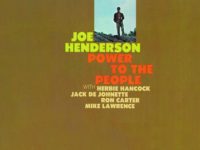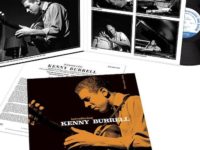On June 30, 2001, tenor saxophonist great Joe Henderson passed away. Among one of the giants in a crowded field of post-bop saxmen who sprang up in the fifities and sixties, Henderson nonetheless never got his due until nearly a quarter century after his superb 1963 debut Page One.
I wanted to commemerate his death with an extensive look at the first ten years of his extensive discography, but, alas, I only got through re-acquainting myself with 5-1/2 of his albums over the past week.
Suffice to say, though, that Joe’s work on the Blue Note label in the sixties under his own name and as a sideman for others is a major reason why that label’s output during that decade is so highly revered among jazz enthusiasts.
The classic Kenny Dorham tunes “Blue Bossa” and “Recorda Me” originated from the debut album and it was around that time when Joe put in some unforgettable playing for Horace Silver during the Song For My Father era.
When Henderson switched over to the Milestone label in 1967, he seemed rejuvenated and issued more great albums, like the well-balanced Tetragon and the pretty early fusion of Power To the People. If you’re building a jazz record collection and hadn’t included Joe Henderson in it yet, you simply should.
Here are what I consider the best of his early stuff:
Page One, 1963 – has the two Dorham classics. One of the finest debuts in Blue Note history.
Inner Urge, 1964 – lacks the standout tunes of Page One, but is more consistent. “El Barrio” is almost as good as “Blue Bossa.”
In ‘N Out, 1964 – This is just nothing but a hot blowing session. All the more reason to pick it up.
Mode For Joe, 1966 – Great compositions, the title tune of one of Cedar Walton’s best, and that’s saying something. Joe demonstrated his inside/outside method well on that track, too. An expanded, all-star lineup.
Tetragon, 1967 – As previously mentioned, it’s nicely varied. Best version of Ron Carter’s “R.J.”. Henderson plays outside like a mutha on “The Bead Game”, then plays pretty on “Invitation” and “Waltz For Zweetie”.
Power To The People, 1969 – With Herbie Hancock on Rhodes, Ron Carter on bass and Jack deJohnette on drums, this sounds vaguely like a In A Silent Way-era Miles record, but it’s more mainstream. Still, it has excellent playing by all and the first recording of the beautiful “Black Narcissus”. But really, you can’t go wrong with any of the other albums recorded before 1971.
Try out a cup o’ Joe today!
- Christian Marien Quartett – ‘How Long Is Now’ (2024) - April 18, 2024
- Dave Douglas, feat. James Brandon Lewis – ‘Gifts’ (2024) - April 11, 2024
- Thollem – ‘Worlds In A Life, Two’ (2024) - April 8, 2024




